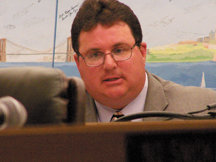A Bayonne councilman wants to know if it’s true that the U.S. Army recently threatened the city with legal action over $55 million in land sale funds that they are not sure the city has used properly.
Nearly a decade ago, the Army deeded waterfront land at its former military base to the city so that the city could work with private developers to redevelop the property.
Under a 2001 Memorandum of Agreement between the city of Bayonne and the Army, all money obtained from the sale or leasing of land had to be reinvested for at least seven years into preparing the site for redevelopment.
However, for several years, the city has borrowed money that private developers gave to the Bayonne Local Redevelopment Agency for the land. The city used the money to help fill budget gaps.
“I hope and pray that the Army is not seeking recoupment of the money from the city of Bayonne.” – Gary LaPelusa
________
A June 14, 2010 letter from the Army appears to suggest that the Army was not happy about the transfer and may want to recoup some of the funds that the city obtained from a land sale. A copy of the letter was obtained by the Community News, but its validity could not be ascertained by press time.
Last week, Councilman Gary LaPelusa said that he has heard that the letter threatened legal action against the BLRA. He said that the council should be advised of the situation at the upcoming June 23 council meeting.
But BLRA Executive Director Christopher Patella announced at the agency’s June 17 meeting that the Army was “pleased” with the results of an audit done regarding the use of proceeds for the sale and other revenue generated out of the former Military Ocean Terminal.
LaPelusa was not persuaded. “Unfortunately, it may well be that Mr. Patella did not provide a complete picture for the public,” he said last week. “I am of the understanding that the Department of the Army has advised Mr. Patella that he has failed to provide documents to the Army that would justify the transfer of close to $55 million from the BLRA to the city of Bayonne, and that the Department of the Army is going to initiate recoupment proceedings to get the money back.”
In the letter – dated June 14 – Joseph Calcara, deputy assistant secretary of the Army, says, “Since the Army has not received all required documentation of proper reinvestment of proceeds prior to the close out of the redevelopment period despite numerous requests over the last year, I have to conclude these $55 million proceeds have not been property reinvested.”
Patella did not respond last week to requests for comment. But commissioners in the past, including a former executive director, said the conflict – which will likely wind up in court – will end when and if the Army officially releases the city from restrictions for reinvestment.
The city has argued that the base was released from the restrictions before the city sold a portion of MOTBY to PortsAmerica in the last two years for $90 million. On the other hand, the Army has argued that the deal was held up by legal action, and that the city signed off on the deal prior to the lifting of the restrictions, so $55 million of the deal should have gone toward preparing the former base for redevelopment, not sent to the city to balance its municipal budget.
LaPelusa said that all communications between the Army and the BLRA should be made public.
To date, letters such as the one sent on June 14 have been sealed, and discussions have been in closed sessions regarding possible legal action.
“For the sake of the taxpayers of the city of Bayonne, I hope and pray that the Army is not seeking recoupment of the money from the city of Bayonne,” LaPelusa said.
The U.S. Army and the BLRA have been going back and forth on the issue for almost two years, after members of a waterfront union complained about the money exchange that allowed the BLRA to transfer funds to the city for use in the budget.
Last July, Calcara wrote to the BLRA saying that it had failed to provide relevant financial data as requested.
“Although we have received the financial statements and an accompanying audit report, these documents by themselves do not support proper reinvestment of proceeds from either the sale or residual exchanges,” Calcara wrote in a July, 2009 letter.
